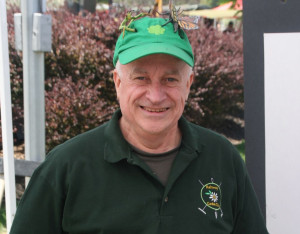
(above) President of The Rahway Garden Club, James Keane has been researching and answering garden questions since 1995. Visit ‘Keane Gardener’ blog at: keanegardener.blogspot.com
After a sixty six day journey seeking religious freedom, the Pilgrims arrived in Massachusetts, far from their destination along the Hudson River. With no suitable place to land most of the Pilgrims spent the first winter on board the Mayflower where many died from hunger and disease.
In early spring when they arrived on land they were surprised to be greeted by an ‘Abenaki Indian’ who already spoke English. A few days later he returned with ‘Squanto’ a Patuxet Indian who also spoke English*.
Squanto took pity on the new settlers and taught them how to farm, gather wild berries, fish in the rivers and hunt. He also taught them how to avoid poisonous plants.
Squanto forged an alliance between the Pilgrims and the local Indian tribe, the Wampanoag.
The main three farm crops of the Wampanoag were corn, beans and squash. Wampanoag also farmed watermelon and sunflowers, gathered blueberries, cranberries, strawberries and hunted game. They taught the pilgrims how to collect maple sap and turn it into maple syrup.
After the first successful corn harvest in November 1621 the leader of the Pilgrims, Governor William Bradford declared a celebration feast, which today is known as the First Thanksgiving.
Although there were earlier feasts to “Thank God Almighty” in the colonies, the one held on December 4, 1619, it is the Pilgrim’s Thanksgiving we remember today.
The 50 surviving Pilgrims and 90 Wampanoag Indians had a three-day feast which included five deer donated by the Wampanoag chief.
Today’s modern holiday feasts are marked by pies and sweet treats, but there were no sweets at the first Thanksgiving because the Pilgrims had already eaten all the maple syrup.
Throughout the decades afterwards Americans would occasionally celebrate a ‘National Day of Thanksgiving’.
In 1863 during the Civil War, President Abraham Lincoln established our annual Thanksgiving Day on the fourth Thursday of every November.
*Before the arrival of the Pilgrims, Squanto and many other members the Patuxet tribe were captured by the British and brought back to England as slaves. The Patuxet tribe members remaining in America died from small pox transmitted by the English. Squanto who now spoke English was able to escape and return to America as a stowaway on another ship. Squanto died on November 30, 1622.
He was buried at Burial Hill, Plymouth, MA.
Happy Thanksgiving,
James

